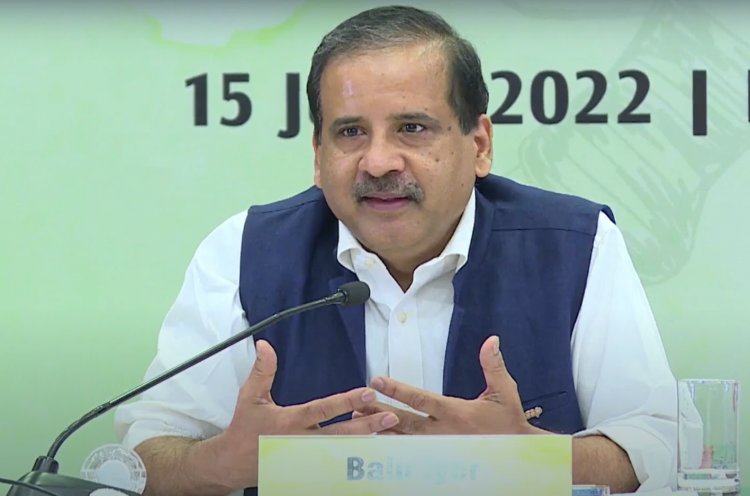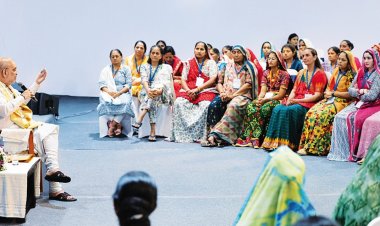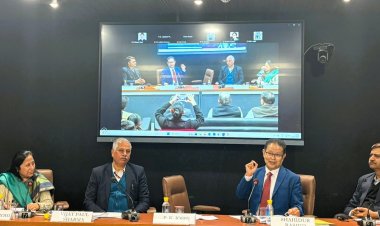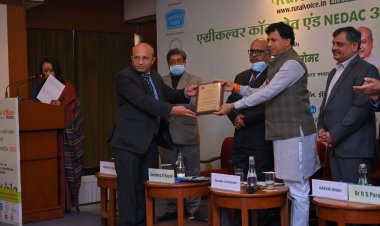Cooperatives should not be merely agriculture- or credit-focused, but rather member-focused: Balu Iyer
Balasubramanian (Balu) Iyer, Chief Executive Officer (CEO), International Cooperative Alliance, Asia-Pacific (ICA-AP), said that co-operatives needed to look across the sectors. They have to change their image of being limited to agriculture and credit. He cited examples from across the world as to how cooperatives were a world of possibilities galore.

Balasubramanian (Balu) Iyer, Chief Executive Officer (CEO), International Cooperative Alliance, Asia-Pacific (ICA-AP), said that co-operatives needed to look across the sectors. They have to change their image of being limited to agriculture and credit. He cited examples from across the world as to how cooperatives were a world of possibilities galore.
Iyer, who has a rich experience with cooperatives in Asia-Pacific, was speaking at a session of the Dialogue on “Sahakar se Samriddhi: Many pathways” organized recently by Rural Voice in association with Sahakar Bharati. The topic for the session was “Global experience in cooperation: How India can benefit”.
If India can benefit from the global experience, so can the world benefit from the Indian experience, said Iyer. Cooperatives like Amul and IFFCO are examples for the world.
According to Iyer, cooperatives could explore several possibilities in the services sector. He said that the contribution of the services sector to India’s GDP was about 50 per cent. But a large part of it is “informal, scattered and not organized”, which Iyer said were “all conditions for cooperatives to fit.” The services sector is a vast area ranging from IT to vendors on the street.
Citing the example of Capricorn from Australia, he said that 17 auto mechanics had set up a cooperative there in 1974. They formed the cooperative because they felt they could not focus on their core business as individuals. If a cooperative was formed, it could take care of non-core requirements like purchasing, credit, marketing and accounting. Today, they have even spread to New Zealand. Capricorn has 25,000 members and its turnover is US$ 2bn.
Iyer also spoke about the necessity of social cooperatives. He said that a large population of the country was ageing. What is the cooperative sector doing for them? “In Japanese agricultural cooperatives, as soon as you are born, you are a member of the cooperative. Your hospital is run by a cooperative.” Similarly, there are hospitals for the ageing and, finally, they have “funeral cooperatives”. Cooperatives, thus, should not be merely “agriculture-focused” or “credit-focused”, but rather “member-focused”.
Technology and cooperatives need to be combined, said Iyer. As of now, platform apps like Ola, Uber, Amazon and Flipkart are driven by profit motives for companies. We can now think of “platform cooperatives”, where the ownership belongs to the members of the cooperatives. Iyer cited the example of Up & Go in the US which is cooperatively owned by professional home cleaners. Not only are the members’ wages higher in comparison to those in private companies but also the profit gets distributed among the members.
Iyer said that youths were interested in start-ups these days. Now, cooperatives are no different from start-ups, he said. “The government should consider this and treat cooperatives as start-ups, too. This recognition is given in other countries.”
Cooperatives also need an image makeover, felt Iyer. When youths are asked about cooperatives, they think these are “traditional, rural and agricultural.” This mindset needs to be changed and we need to learn from other countries how they are promoting technology, enterprise and start-ups through cooperatives.
Speaking about the significance of raising capital for the cooperatives, Iyer said that several countries had made arrangements for this. In the United Arab Emirates (UAE), cooperatives have been allowed to bring IPOs and raise funds from the capital market. We can also take a leaf or two from Italy and France when it comes to raising capital.
Iyer said, “Governance is another important area where we can learn a lot from other countries.” In New Zealand, if you want to stand for election to the Board of Directors, you have to first fill out a survey. They ask you why you want to get elected to the post. This is followed by an interview that further scrutinizes your intent. Thus, your genuine interest in the cooperative gets assessed.



 Join the RuralVoice whatsapp group
Join the RuralVoice whatsapp group







































